Hoosier History Live is an independently produced new media project about Indiana history, integrating podcasts, website, newsletter, and social media. Its original content comes initially from a live with call in weekly talk radio show hosted by author and historian Nelson Price. You can hear the show live Saturdays from noon to 1 pm ET. It’s over the air in Central Indiana at WICR 88.7 fm, or you can stream at the WICR HD1 app on your phone.
November 18, 2023
State Archives: a follow-up
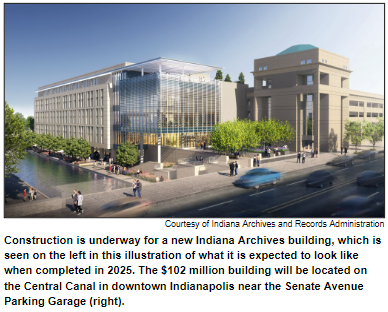
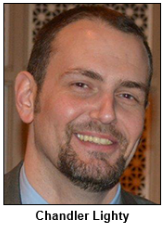 With construction finally underway of a new home for the Indiana Archives, which include a trove of historic material such as the transcripts of landmark court cases, Hoosier History Live will follow up a show we did last year about the status of the archives. In addition to highlighting aspects of the $102 million structure being built on the downtown canal in Indianapolis, we also will spotlight some of the landmark court cases, which range from "slave trials" early in the state's history to the death penalty case involving a teenage girl and a gruesome murder in 1906.
With construction finally underway of a new home for the Indiana Archives, which include a trove of historic material such as the transcripts of landmark court cases, Hoosier History Live will follow up a show we did last year about the status of the archives. In addition to highlighting aspects of the $102 million structure being built on the downtown canal in Indianapolis, we also will spotlight some of the landmark court cases, which range from "slave trials" early in the state's history to the death penalty case involving a teenage girl and a gruesome murder in 1906.
Nelson's returning guest will be Chandler Lighty, executive director of the Indiana Archives and Records Administration. For more than 20 years, many of the state's archives, which include the original Indiana State Constitution of 1816, have been housed in a deteriorating warehouse on the eastside of Indianapolis that was intended to be temporary and is not sufficiently climate controlled. A tunnel will connect the new Archives building with other buildings on the state government campus.
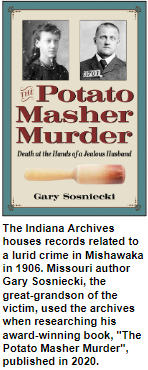 To share insights about the landmark court cases with transcripts housed in the archives, Chandler has consulted with former Indiana Supreme Court Chief Justice Randy Shepard, who was a guest on Hoosier History Live in 2019. The cases include two that became known as "slave trials" in the early 1820s involving teenage African American girls. The cases tested the then-new constitution prohibiting slavery in Indiana. During this show, Chandler will discuss one of the cases, involving a teenager in Vincennes named Polly Strong. On Hoosier History Live, we have explored the other "slave trial", which also involved an enslaved teenager, Mary Bateman Clark, on a show that we rebroadcast most recently in 2020; our guest was well-known Indianapolis journalist and historian Eunice Trotter, a descendant of Mary Bateman Clark.
To share insights about the landmark court cases with transcripts housed in the archives, Chandler has consulted with former Indiana Supreme Court Chief Justice Randy Shepard, who was a guest on Hoosier History Live in 2019. The cases include two that became known as "slave trials" in the early 1820s involving teenage African American girls. The cases tested the then-new constitution prohibiting slavery in Indiana. During this show, Chandler will discuss one of the cases, involving a teenager in Vincennes named Polly Strong. On Hoosier History Live, we have explored the other "slave trial", which also involved an enslaved teenager, Mary Bateman Clark, on a show that we rebroadcast most recently in 2020; our guest was well-known Indianapolis journalist and historian Eunice Trotter, a descendant of Mary Bateman Clark.
In addition to housing records connected with those trials, the Indiana Archives also has transcripts and material involving sensational crimes. Chandler notes that case files at the archives – including testimony and crime history -- were used by the author of a recent, best-selling book, The Potato Masher Murder, about a shocking crime in 1906 in Mishawaka. The author, Gary Sosniecki, a retired journalist in Missouri, is the great-grandson of the victim, who was beaten unconscious by her jealous husband with a wooden potato masher, then set on fire. Although the murder was front-page news across northern Indiana for more than one year, subsequent generations of the family kept the lurid crime a secret. Chandler plans to discuss the use of the archives by the author, although the case isn't considered among the state's most historically significant by former Chief Justice Shepard.
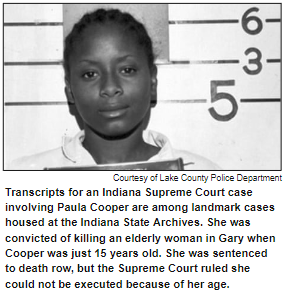 Significant Indiana Supreme Court cases involving sensational crimes do include the case of Paula Cooper, who was 15 years old in 1985 when she was arrested for killing an elderly Bible school teacher in Gary. Paula Cooper received the death penalty. In a landmark decision, though, the Indiana Supreme Court ruled that she could not be executed because of her age. (In 2015, Paula Cooper committed suicide.)
Significant Indiana Supreme Court cases involving sensational crimes do include the case of Paula Cooper, who was 15 years old in 1985 when she was arrested for killing an elderly Bible school teacher in Gary. Paula Cooper received the death penalty. In a landmark decision, though, the Indiana Supreme Court ruled that she could not be executed because of her age. (In 2015, Paula Cooper committed suicide.)
Records related to that decision are housed at the archives, as are transcripts of a landmark case involving an alleged bootlegger in 1922. During our show, Chandler will discuss the importance of the decision by the Indiana Supreme Court, which ruled that law enforcement must have a proper search warrant to seize evidence. The decision in Indiana occurred decades before a national ruling by the U.S. Supreme Court involving improperly seized evidence.
At the groundbreaking for the new State Archives building, speakers included our guest Chandler Lighty and Gov Eric Holcomb. The building, which will be five stories high with 133,000 square feet, is expected to be completed in late 2025 or early 2026.
Your contributions help keep Hoosier History Live on the air, on the web, in your inbox, and in our ARCHIVES!

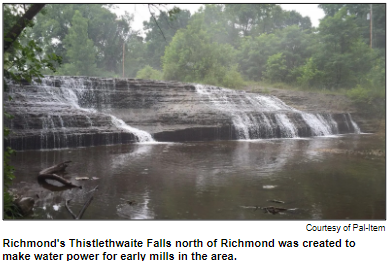
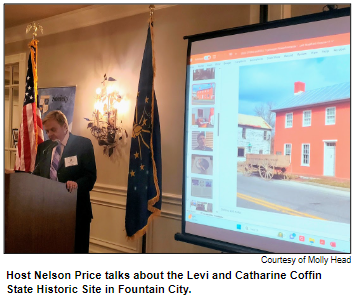





 At the top of our newsletter and website we put notice, and links, to our newly published podcasts. We also provide a link to
At the top of our newsletter and website we put notice, and links, to our newly published podcasts. We also provide a link to 

